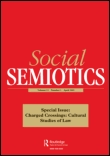
Social Semiotics
Scope & Guideline
Bridging Disciplines: Language, Culture, and Communication
Introduction
Aims and Scopes
- Multimodal Communication:
Research articles frequently investigate how multiple modes of communication (text, image, sound, etc.) interact to create meaning, particularly in contemporary digital contexts. - Cultural and Political Semiotics:
The journal emphasizes the exploration of semiotic resources in cultural and political discourse, analyzing how identities and power relations are constructed and contested. - Critical Discourse Analysis:
A strong focus on critical discourse analysis allows for the examination of language and semiotic practices in relation to social justice, ideology, and representation. - Ethnographic and Contextual Studies:
Many studies incorporate ethnographic methods to understand the semiotic dimensions of everyday life, examining how people produce and interpret signs in specific cultural contexts. - Interdisciplinary Approaches:
The journal encourages interdisciplinary research, drawing from linguistics, sociology, media studies, and cultural studies to enrich the understanding of semiotic phenomena.
Trending and Emerging
- Digital Semiotics and New Media:
Increasingly, publications focus on how digital platforms and new media shape communication practices, exploring the semiotic implications of emojis, memes, and social media discourse. - Environmental and Ethical Semiotics:
Emerging themes around environmental communication and ethical considerations in semiotic practices are gaining traction, addressing the role of semiotics in sustainability and social justice. - Intersectionality in Semiotic Analysis:
There is a growing trend towards examining how multiple identity factors (such as race, gender, and class) intersect in semiotic practices, providing nuanced understandings of representation. - Globalization and Transnational Semiotics:
Research increasingly addresses the effects of globalization on semiotic practices, particularly how local cultures adapt and respond to transnational influences. - Affective and Emotional Semiotics:
Emerging interest in the semiotics of affect emphasizes how emotions and feelings are communicated and interpreted, reflecting a broader cultural shift towards understanding emotional expression.
Declining or Waning
- Traditional Linguistic Analysis:
There appears to be a decrease in publications centered solely on traditional linguistic analysis, as the journal increasingly favors multimodal and interdisciplinary approaches. - Static Representations of Culture:
Research focusing on static or monolithic representations of culture is less prevalent, with more emphasis on dynamic and fluid understandings of cultural identity. - Narrowly Defined Semiotic Frameworks:
The use of overly rigid semiotic frameworks that do not accommodate the complexities of contemporary communication practices is becoming less common, as scholars seek more flexible models.
Similar Journals

Biosemiotics
Decoding the Language of Life: Where Biology Meets SemioticsBiosemiotics, published by SPRINGER, is a leading journal dedicated to the interdisciplinary study of biosemiotics, bridging the gaps between biology, linguistics, and social sciences. Established in 2008, this journal has rapidly gained recognition in the academic community, evidenced by its strong ranking within various categories, achieving a Q1 status in Linguistics and Language and notable placements in Communication and Social Sciences as of 2023. With an impressive Scopus rank that places it in the 90th percentile among Language and Linguistics journals, Biosemiotics serves as a crucial platform for researchers and professionals exploring the semiotic processes that underlie biological communication. The journal's focus on both theoretical and empirical studies is reflected in its diverse range of articles, which contribute to the understanding of sign processes in the living world. Although it does not offer open access, its contributions are vital for advancing knowledge in biosemiotics and related fields. Located in the Netherlands, at VAN GODEWIJCKSTRAAT 30, 3311 GZ DORDRECHT, Biosemiotics continues to shape dialogues around the semiotic dimensions of life, making it an essential resource for students, researchers, and professionals alike.

Revista da Anpoll
Bridging the gap between theory and practice in linguistics.Revista da Anpoll is a prestigious academic journal dedicated to the fields of Letters and Linguistics, published by the ASSOC NAC POS-GRADUACAO PESQUISA LETRAS & LINGUISTICA in Brasilia, Brazil. Since its inception in 1994, this Open Access journal has aimed to foster scholarly communication and lead discourse in the linguistic and literary disciplines, allowing researchers and practitioners free access to cutting-edge research and findings. Although it does not currently have an H-index, the journal continues to attract high-quality submissions from experts in its field, contributing to the global academic community. By offering a platform for innovative studies and discussions, Revista da Anpoll plays a critical role in advancing knowledge and practice within linguistics and literary studies, making it an invaluable resource for academics, professionals, and students alike.
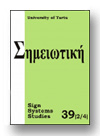
Sign Systems Studies
Shaping the Future of Linguistic StudiesSign Systems Studies is a premier interdisciplinary journal published by Tartu University Press, focusing on the intricate relationships between language, meaning, and communication. With an ISSN of 1406-4243 and an E-ISSN of 1736-7409, this esteemed publication has been an open-access resource since 2009, ensuring that cutting-edge research is accessible to a global audience. Based in Estonia, this journal has made significant strides in the field of Linguistics and Language, achieving a Q1 category ranking in 2023 and impressive Scopus rankings in both Arts and Humanities and Social Sciences. The journal not only fosters scholarly discourse but also encourages innovative research methodologies across its scope. With its continual growth and impactful contributions recognized worldwide, Sign Systems Studies plays a vital role in advancing the understanding of language systems, making it an invaluable resource for researchers, professionals, and students dedicated to the study of linguistics.

deSignis
Decoding the Art of Meaning in DesigndeSignis is a distinguished open-access journal published by the Federación Latinoamericana Semiotic, dedicated to advancing the field of semiotics and design. With its ISSN 1578-4223 and E-ISSN 2462-7259, deSignis serves as a crucial platform for researchers, practitioners, and students seeking to explore the intricate relationships between sign systems and design processes. Since its inception in 2004, this journal has fostered diverse scholarly discourse, contributing significantly to the understanding of visual culture, communication theories, and aesthetic practices. Its commitment to open access ensures that high-quality research is accessible to a global audience, promoting collaboration and innovation. Located in Paris, France, deSignis continues to be a vital resource for those interested in the interdisciplinary applications of semiotics in contemporary design.
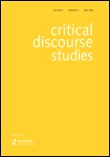
Critical Discourse Studies
Transforming Understanding Through Rigorous Discourse StudiesCritical Discourse Studies is a leading journal in the field of discourse analysis and communication, published by Routledge Journals, a prestigious imprint of Taylor & Francis Ltd. Established in 2005, it has garnered a significant reputation for its rigorous scholarly articles that explore the intricate relationships between language, power, and social practices. With an impressive Q1 classification in Social Sciences (miscellaneous) as of 2023, the journal serves as an essential platform for researchers, professionals, and students seeking to delve into critical perspectives on discourse analysis. Although not open access, its comprehensive peer-reviewed articles are instrumental in advancing understanding in areas such as sociolinguistics, cultural studies, and communication theory. Critical Discourse Studies thus stands as a vital resource for those engaged in the study of discourse and critical theory, consistently contributing to the dialogue on how language shapes and is shaped by societal structures.

Rivista Italiana di Filosofia del Linguaggio
Bridging Disciplines Through Language PhilosophyRivista Italiana di Filosofia del Linguaggio is a prominent academic journal dedicated to the exploration of linguistic philosophy and its intersections with various fields of study, such as linguistics, cognitive science, and semiotics. Published by UNIV STUDI CALABRIA, this journal seeks to foster scholarly discourse and critical analysis by providing a platform for innovative research and theoretical perspectives. With an expectation of rigorous peer review, the journal welcomes contributions that dissect the intricate relationship between language and thought, promoting a deeper understanding of linguistic phenomena. Although Rivista Italiana di Filosofia del Linguaggio operates under a traditional subscription model, its commitment to high-quality scholarship makes it a vital resource for researchers, professionals, and students alike who are engaged in the burgeoning field of linguistic philosophy. Based in Italy, and specifically located at CAMPUS ARCAVACATA, VIA PIETRO BUCCI, ARCAVACATA DI RENDE CS 87036, this journal continues to expand its international reach by attracting contributions from diverse academic backgrounds.

CIC-Cuadernos de Informacion y Comunicacion
Pioneering Critical Analysis in Communication and MediaCIC-Cuadernos de Informacion y Comunicacion is a leading academic journal published by the Universidad Complutense de Madrid, serving as a vital resource for scholars and practitioners in the fields of information and communication studies. Launched in 1995 as an Open Access journal, it provides an invaluable platform for disseminating innovative research and critical analysis related to communication theory, media studies, and information technology. With its focus on fostering interdisciplinary dialogue, CIC encourages submissions that explore contemporary challenges and advancements in the information landscape. Although the H-index and Scopus rankings are currently not specified, the journal’s commitment to excellence and accessibility positions it as an important contributor to academic discourse. The journal is based in Madrid, Spain, and aims to reach a global audience of researchers, professionals, and students dedicated to furthering knowledge in the rapidly evolving domains of communication and information sciences.
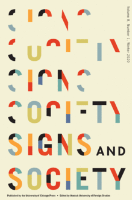
Signs and Society
Fostering Dialogue on Cultural Expression and CommunicationSigns and Society is an acclaimed academic journal published by University of Chicago Press, specializing in the interdisciplinary exploration of semiotics, cultural representations, and communication practices. With an impressive ISSN of 2326-4489 and E-ISSN 2326-4497, this journal has established itself as a credible source of research and insight within its fields. It operates under a robust framework with a convergence of topics from 2015 to 2024, and has achieved notable rankings, including Q1 placements in Cultural Studies, Linguistics and Language, and Visual Arts and Performing Arts in 2023, elevating it to a leading status among its peers. The journal’s impact is reflected in its Scopus rankings, positioning it in high percentiles across diverse categories, making it a vital resource for scholars, practitioners, and students interested in the intricate relationships between signs, society, and culture. Although not an open access publication, Signs and Society remains essential for those seeking to deepen their understanding of communication dynamics and the multifaceted dimensions of cultural expression.
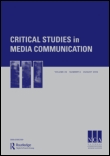
CRITICAL STUDIES IN MEDIA COMMUNICATION
Fostering Interdisciplinary Insights in Media ResearchCRITICAL STUDIES IN MEDIA COMMUNICATION, published by Routledge Journals, Taylor & Francis Ltd, stands as an influential platform for discourse in the field of communication studies. With an ISSN of 1529-5036 and an E-ISSN of 1479-5809, the journal provides an invaluable resource for researchers, professionals, and students exploring the complexities of media interactions and their socio-cultural implications. The journal has established a solid reputation, evidenced by its categorization as Q2 in Communication for 2023 and its impressive Scopus ranking of #189 out of 511 within the Social Sciences _ Communication category, placing it in the 63rd percentile. Operating out of the United Kingdom, CRITICAL STUDIES IN MEDIA COMMUNICATION encompasses a scope that debates critical theory versus applied media research, fostering interdisciplinary dialogue that addresses emerging trends and critical issues within the media landscape. With a commitment to open access and forward-thinking scholarship, this journal not only enhances academic understanding but also actively shapes practices within the communication field as it continues through its converged years from 1996 to 2024.
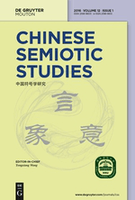
Chinese Semiotic Studies
Advancing Semiotic Insights in Chinese CultureChinese Semiotic Studies is a pivotal journal published by DE GRUYTER MOUTON, specializing in the interdisciplinary exploration of semiotics within the context of Chinese language and culture. Established in 2009, this journal serves as a crucial platform for scholars and researchers, addressing the intricate relationships between semiotic theory, communication, and linguistic practices in China. With its current rankings placing it in the Q3 category for Communication and Q2 for Linguistics and Language, Chinese Semiotic Studies is recognized for its significant contribution to the academic discourse in these fields. Although it operates under a subscription model, the journal offers robust opportunities for knowledge dissemination and research collaboration among professionals and students alike. By fostering a deeper understanding of semiotic processes, the journal plays an essential role in advancing scholarship and innovation within the realms of linguistics and communication, making it a valuable resource for anyone interested in the dynamic interplay of language, culture, and meaning.